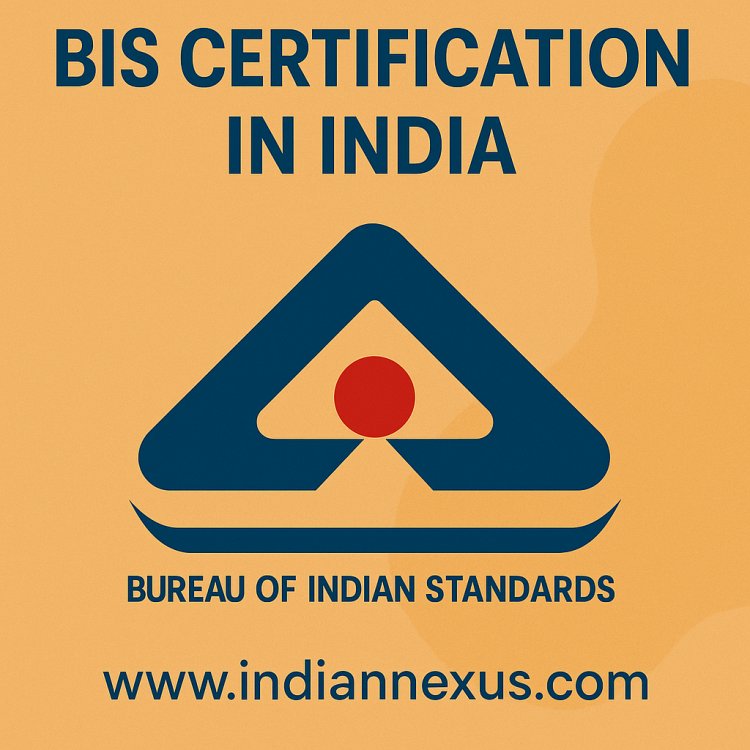BIS Certification and Registration
Get BIS Certification and Registration for ISI or CRS products in India. Ensure compliance, safety, and legal market entry with expert BIS consultant support.
Share this Post to earn Money ( Upto ₹100 per 1000 Views )

In today’s quality-driven market, ensuring product safety and compliance is critical. That’s where BIS Certification and Registration comes in. Administered by the Bureau of Indian Standards (BIS), this certification validates that a product conforms to the quality, safety, and reliability standards defined for the Indian market. Whether you are a manufacturer, importer, or exporter, BIS registration is mandatory for a wide range of products before they can be sold in India.
This guide provides a comprehensive overview of BIS certification, types, benefits, procedures, and why it's essential to partner with a reliable BIS consultant for a seamless experience.
What is BIS Certification?
BIS Certification is a conformity assessment issued by the Bureau of Indian Standards, the national standardization body of India under the Ministry of Consumer Affairs, Food & Public Distribution. It ensures that a product adheres to Indian standards (IS) related to safety, quality, and performance.
The BIS mark assures consumers that the product is tested and certified to meet Indian quality norms. For certain products, BIS certification is mandatory by law.
Why is BIS Certification Important?
-
Mandatory Compliance: For over 300+ products including electronics, toys, cement, pressure cookers, and more.
-
Market Entry: Without BIS certification, products cannot be legally sold in the Indian market.
-
Consumer Trust: The ISI mark (for domestic products) or CRS mark (for electronics) boosts credibility.
-
Government Tenders: BIS-certified products qualify for many public and private procurement projects.
-
Reduced Risk: Ensures the safety and performance of critical consumer goods.
Types of BIS Certification in India
There are three main types of BIS certification depending on the product and its origin:
1. ISI Certification (Domestic Manufacturers)
The ISI mark (Indian Standards Institute) is mandatory for certain products manufactured in India. This involves factory inspection and regular product testing.
Examples: Electrical appliances, cement, pressure cookers, steel products, packaged drinking water.
2. CRS Registration (Electronics & IT Goods)
Under the Compulsory Registration Scheme (CRS), notified electronic and IT products must be registered with BIS before sale or import in India. Products are tested in BIS-recognized labs and must be labeled with the CRS logo.
Examples: Mobile phones, laptops, LED lights, power banks, smartwatches.
3. FMCS Certification (Foreign Manufacturers Certification Scheme)
Foreign manufacturers exporting certain products to India must obtain the BIS license through FMCS. This includes factory audit by BIS officials, testing in Indian labs, and compliance with Indian standards.
Products Requiring BIS Certification (Examples)
-
Cement, steel, and construction materials
-
Electrical appliances like refrigerators, fans, heaters
-
Consumer electronics: TVs, phones, laptops
-
Toys and safety equipment
-
Kitchenware: pressure cookers, gas stoves
-
Batteries and power banks
-
Medical devices (under expansion of scope)
BIS Certification Process
Step 1: Identify Product Standard
Check whether your product is under mandatory BIS certification. Identify the applicable Indian Standard (IS).
Step 2: Choose Certification Type
Determine the suitable scheme — ISI, CRS, or FMCS — depending on your product and origin.
Step 3: Testing at BIS Recognized Lab
The product must be tested at a BIS-accredited laboratory for compliance with applicable Indian Standards.
Step 4: Application Submission
Submit the complete application with test reports, documents, manufacturing details, and labeling information to BIS.
Step 5: Factory Audit (For ISI/FMCS)
For ISI and FMCS, BIS officials will conduct a factory inspection to verify production processes, quality control systems, and facility compliance.
Step 6: Grant of License
Once verified and approved, BIS issues a BIS certification license, allowing you to affix the ISI mark or CRS logo on your products.
Step 7: Ongoing Surveillance
Licensed manufacturers are subject to surveillance audits and regular product testing to ensure continued compliance.
Key Documents Required
-
Business license or company registration
-
Manufacturing facility layout and production details
-
Test report from BIS-approved lab
-
Authorization letter (in case of an agent)
-
Quality control parameters and process flow
-
Trademark certificate (if applicable)
-
Factory inspection reports (for ISI/FMCS)
BIS Certification Validity and Renewal
-
BIS licenses are generally valid for 2 years, subject to compliance.
-
Renewal must be initiated before expiration with updated documents and test reports.
-
CRS registrations are also valid for 2 years and can be renewed online through the BIS portal.
Role of a BIS Consultant
Hiring a BIS consultant in India can greatly simplify the certification process. Here’s how:
-
Product Classification: Helps in identifying whether your product falls under mandatory BIS scope.
-
Document Preparation: Ensures all paperwork and technical files are accurate.
-
Lab Testing Support: Coordinates testing in BIS-recognized labs.
-
Application Filing: Submits applications on BIS portals (Manakonline or CRS portal).
-
Inspection Preparation: Guides manufacturers during audits and factory visits.
-
Post-Certification Compliance: Handles renewals, changes, and communication with BIS.
Challenges Without a BIS Consultant
-
Application delays due to incorrect or incomplete documentation
-
Test report rejection or mismatches
-
Factory inspection failures
-
Misunderstanding of Indian standards or BIS procedures
-
Penalties or product recalls for non-compliance
BIS and Make in India Initiative
BIS plays a crucial role in promoting the “Make in India” initiative. With strict enforcement of quality standards and safety norms, it ensures only certified and safe products enter the Indian market — boosting consumer confidence and domestic manufacturing.
Conclusion
Whether you're a domestic manufacturer or an international exporter, BIS certification and registration is crucial for accessing the Indian market. With growing emphasis on consumer safety, government compliance, and product quality, obtaining BIS approval is not just a formality — it’s a business necessity.
Partnering with a trusted BIS consultant ensures a smooth certification journey from testing to licensing, helping you launch your product in India confidently and compliantly.
















